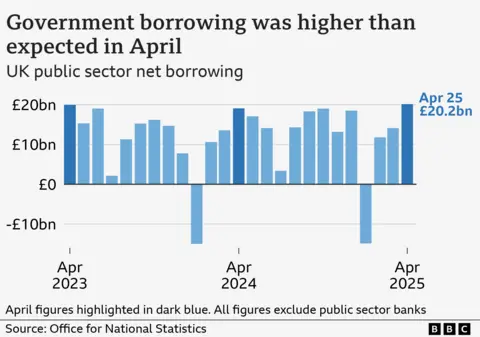Tax rise warning after higher-than-expected UK borrowing
 Getty Images
Getty ImagesHigher-than-expected government borrowing figures have increased the prospect of Chancellor Rachel Reeves raising taxes in the autumn, experts say.
Borrowing - the difference between spending and tax income - was £20.2bn in April, up £1bn from the same month last year, official figures showed.
It is the fourth highest April figure since monthly records began in 1993 and analysts said it could mean Reeves will struggle to meet her self-imposed rules on spending and borrowing.
Ruth Gregory, Capital Economics deputy chief UK economist, said the "poor start" to the financial year meant tax rises were "starting to feel inevitable".
She said weaker economic growth forecast over the next few months was likely to hit tax receipts, adding to pressure on government finances.
"With the PM announcing a partial U-turn on the cut to winter fuel payments, the dilemma faced by the chancellor over how to deal with increased spending pressures in environment of low economic growth and high interest rates hasn't gone away," Ms Gregory said.
Matt Swannell, chief economic adviser to the EY Item Club, said: "Talk of the reinstatement of some winter fuel payments and the likely need to spend more on defence will further increase the pressure for tax rises."
On Wednesday, Prime Minister Sir Keir Starmer announced plans to ease cuts to winter fuel payments, in a U-turn following mounting political pressure in recent weeks.
In her October 2024 Budget, Reeves had introduced £40bn in tax increases, the largest since 1993. However, at the time she pledged there would be no additional tax rises beyond those already announced.
The chancellor is following two main rules, which she has argued will bring stability to the UK economy:
- day-to-day government costs will be paid for by tax income, rather than borrowing
- to get debt falling as a share of national income by the end of this parliament in 2029-30
Reacting to the latest borrowing figures, Chief Secretary to the Treasury Darren Jones said: "After years of economic instability crippling the public purse, we have taken the decisions to stabilise our public finances, which has helped deliver four interest rate cuts since August, cutting the cost of borrowing for businesses and working people."
Conservative shadow chancellor Mel Stride said: "Instead of reining in spending, the Labour chancellor has piled billions onto the national debt by fiddling the fiscal rules and maxing out the national credit card."
Liberal Democrat Treasury spokesperson Daisy Cooper accused the chancellor of making "a series of blunders".
"The warning lights must be flashing in the Treasury this morning," she said.

April's borrowing figure was higher than expected, with analysts having predicted £17.9bn.
Tax receipts were more than £5bn higher, in part due to increases in National Insurance contributions paid by employers.
But government expenditure also rose, largely due to pay rises, higher costs due to inflation, and increases in pensions and other benefits.
The Office for National Statistics also said that borrowing for the financial year that ended in March is now estimated to be £148.3bn, which is £3.7bn less than initially thought.
However, the figure is still £11bn more than had been predicited by the UK government's independent forecaster, the Office for Budget Responsibility.
